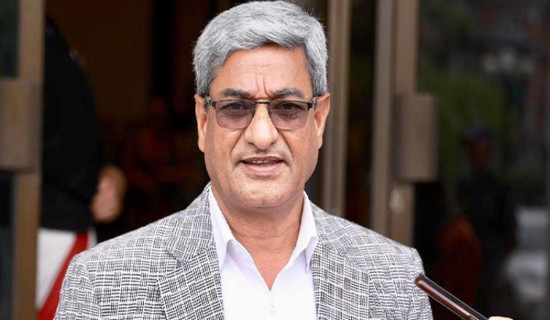- Thursday, 25 December 2025
No Need To Panic About Deposits
Nepal’s economy is going through a bad patch. But the economic woes are not so grave as are painted. The general people have compared the economy of the country to those of Pakistan, Bangladesh and Sri Lanka. The Pakistani economic crisis is, for example, due to devaluation of the Pakistani rupee against the US dollar, dwindling forex reserves, high inflation and political instability, among others. Furthermore, climate change, the COVID-19 pandemic, the Ukraine war and global recession have also exacerbated the economy of Pakistan.
The Nepal Rastra Bank (NRB) adopted harsh measures to protect the economy in the recent past. It banned the import of some luxury goods for seven months. The ban was lifted on December 25, 2022. Likewise, the cash margin provision for certain goods was lifted after 13 months on January 10, 2023. These measures were aimed at preventing the forex reserves from further dwindling. Moreover, after the formation of the new government on December 25, 2022, the implementation of the working capital guidelines has been relaxed.
Current expenditure
The federal system has increased current expenditure. At present, the internal revenue is not enough to cover the current expenditure. This means, there is a need for foreign loans or grants for the execution of development projects. The public debt has soared to around Rs. 2 trillion 7 billion. The public debt constitutes 41 per cent of the gross domestic product. Five years ago, such a percentage was 22 per cent.
There is no doubt that that the global economy is in recession. There is an acute need for protecting the country from the effects of such global recession. Businessmen and industrialists tend to blame the economic malaise on high lending interest rates and tight monetary policy. The main reason for the inability to meet the current expenditure through internal revenue is that there is a decrease in revenue mobilisation along with imports.
As per the data for seven months of this fiscal year released by the NRB, Nepal is gradually recovering from the effects of the COVID-19 pandemic. There is a balance of payments (BOP) surplus of Rs. 133.21 billion as against a deficit of Rs. 247.03 billion during the corresponding period of last fiscal year. Forex reserves have jumped by 13.8 per cent and are enough for covering imports for 10.8 months. Remittances have increased by 27.1 per cent to reach 689.88 billion.
The International Monetary Fund (IMF) has reviewed the country’s economic indicators through its Article IV mission. As per the report, the economy of the country is recovering from the adverse effects of global recession and the country needs to focus on several key areas. The tight monetary policy adopted last year has helped stabilise the external position and contributed to lowering inflation.
So the economy of the country is not as bad as portrayed in the business and industry sectors. However, there are certain areas where reforms can improve the economy. Undesirable activities at border points regarding the entry of foreign goods into the country such as under-invoicing or non-payment of customs duties need to be discouraged. Releasing of the assets of businesses locked in real estate or shares should be facilitated by formulating proper rules and regulations. There should be an appropriate interest policy. Higher lending interest rates would lead to lower investments. Lower deposit interest rates may lead to a liquidity crunch. So there should be a proper match between lending and deposit interest rates.
The businessmen and industrialists should not kick up a commotion about the condition of banks and financial institutions (BFIs) as if they would soon collapse. If anything, they should collaborate with the government and the NRB to improve the banking sector. It should be borne in mind that the condition of the economy of the country is not the same as those of Pakistan, Bangladesh and Sri Lanka. It is wrong to surmise what has happened to these countries will also happen in the country. Further, the businessmen and industrialists should not make unreasonable demands such as drastically slashing lending interest rates and waiving the repayment of loans up to a certain amount.
Rumours
There are rumours swirling around that the BFIs as well as cooperatives are facing a cash shortage. When there is the run on a bank, no bank can cope with the situation. Such a situation has not emerged in the country. And such a situation should not be allowed to emerge. There should be a good bond between the BFIs and their customers – depositors, borrowers and other service-seekers. The depositors should repose faith in the BFIs. The borrowers should utilise the loans they have availed themselves of from the BFIs. Using the loans for one purpose for some other purpose may create problems in loan repayment. In such a situation, blaming the BFIs for higher rates of interest cannot be justified.
However, signs of improvement in the banking sector are appearing. Deposit mobilisation is gradually improving, enabling the BFIs to accumulate loanable funds. However, the loan clients are expecting lending interest rates to plummet further so that they can enjoy loans at a lower rate of interest. As the economy of the country is also recovering, all will be well in the foreseeable future. There is no need for the general public to worry about their deposits maintained with the BFIs.
(Maharjan has been regularly writing on contemporary issues for this daily since 2000.)
















